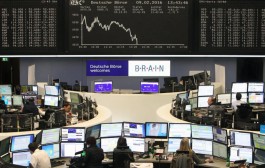Bitcoin's rise to $35,000 contributes to restoring its reputation in the investment world. The rise of the world's largest cryptocurrency has more than doubled compared to its price after last year's devastating collapse, a major development at a time when stocks fell and bond yields rose. In light of the US Federal Reserve's intention to continue raising interest rates, and geopolitical tensions threatening financial stability, some advisors believe that adding Bitcoin to investment portfolios could be a good way to diversify.
This development is a big change from last November, when the bankruptcy of FTX — which sparked fraud charges that took its founder Sam Bankman-Fried to trial — sent cryptocurrencies into a tailspin, with Bitcoin trading below $16,000. Although many wealth advisors still caution against investing in cryptocurrency, as it is prone to volatility, others argue that a limited allocation can help spread out the risks in your investment portfolio.
From retirees to young adults, Bitcoin should have a stake in any balanced investment portfolio, said Vaughn Kellerman, associate wealth advisor at HCM Wealth Advisors in Cincinnati.
Kellerman typically recommends an allocation of between 1% and 3%, but this range ranges up to about 5%, depending on the investor's risk tolerance and the scope of his portfolio.
Bitcoin's first-mover advantage as the largest cryptocurrency makes it a safer bet than some of the newer, more volatile cryptocurrencies, including decentralized finance projects that have come under scrutiny.
No association with stocks and bonds
Ryan Firth, a financial planner at Mercer Street in Bellaire, Texas, believes that the appeal of Bitcoin is its lack of correlation with stocks and bonds, at least in recent months. Since the beginning of September, the cryptocurrency has risen by 34%, while the S&P 500 and Nasdaq 100 have fallen by about 8%.
Bitcoin's resurgence as a potential hedge against inflation—due to its immutable and decentralized nature—is also noteworthy, Firth said. Despite interest rate hikes by the Federal Reserve, average consumer prices are still rising.
Tracking a potential Bitcoin exchange-traded fund could encourage everyday people to add crypto to their portfolios more than ever before. Although the industry has been trying for years to launch such a product, it has repeatedly faced confrontations with regulators, which are concerned about the volatile nature of crypto and the potential for manipulation in the industry.
But in recent months, that prospect seems to be improving, as BlackRock has been...
Last June, BlackRock Inc. submitted an application to establish a Bitcoin ETF, and last August a judge overturned a prior decision prohibiting the transfer of a Bitcoin fund from Grayscale Investments LLC to a traded fund. These developments are also helping to boost the price of Bitcoin.
Mike Kelly, founder of Kelly Financial Planning in Cincinnati, says launching an exchange-traded fund would be the best way for the average person to invest in Bitcoin, and he recommends keeping allocations under 5%.
He added: It is the same recommendation for one share. You seek to maintain diversification in the portfolio, and not allow one investment position to collapse your portfolio.
Against encryption
On the other hand, others in the financial advisory world still view Bitcoin as a risky bet, closer to speculation than a long-term investment.
In this regard, Brian Duncanson, a financial planner in Vero Beach, Florida, said: Bitcoin, and cryptocurrencies in general, are still a predominantly speculative asset class. It is not a security for which an operating company builds its value, rather the value is simply a market driven by supply and demand.
Duncanson recommends that his clients buy only a very limited amount - if any at all - to use as an asset for speculation and entertainment, especially given the prevalence of fraud throughout the industry.
In addition, some financial planners, such as Daniel Yerger, president of MY Wealth Planners in Longmont, Colorado, question the claim that Bitcoin actually allows diversification.
He said: Bitcoin is steadily linked to broader stock market movements in terms of market gains and losses, and given that its value depends entirely on market sentiment, it is unlikely to stop being a highly volatile asset in the near future.
Move in opposite directions
Let's take last year as an example. In 2022, Bitcoin's value fell by 64%, as the S&P 500 index fell by 19%. To truly be a diversifier, these prices must move in opposite directions.
Then there's the fact that it's nearly impossible to use Bitcoin as payment for everyday necessities, said Eric Roberge, founder of Boston-based financial planning firm Beyond Your Hammock. In order to use them for purchases, you must convert them into dollars or another currency, while the exchange rate is highly volatile.
He added that the argument that Bitcoin could serve as a hedge against inflation is an argument that assumes that the cryptocurrency has value in itself, and will reliably hold that value in the face of a certain set of risks.
Roberg continued: Bitcoin carries no guarantee that it will not lose its value in the face of inflation risks, or any number of other market risks. It is vulnerable to a decline to zero, and there is nothing really preventing it from sliding.







































